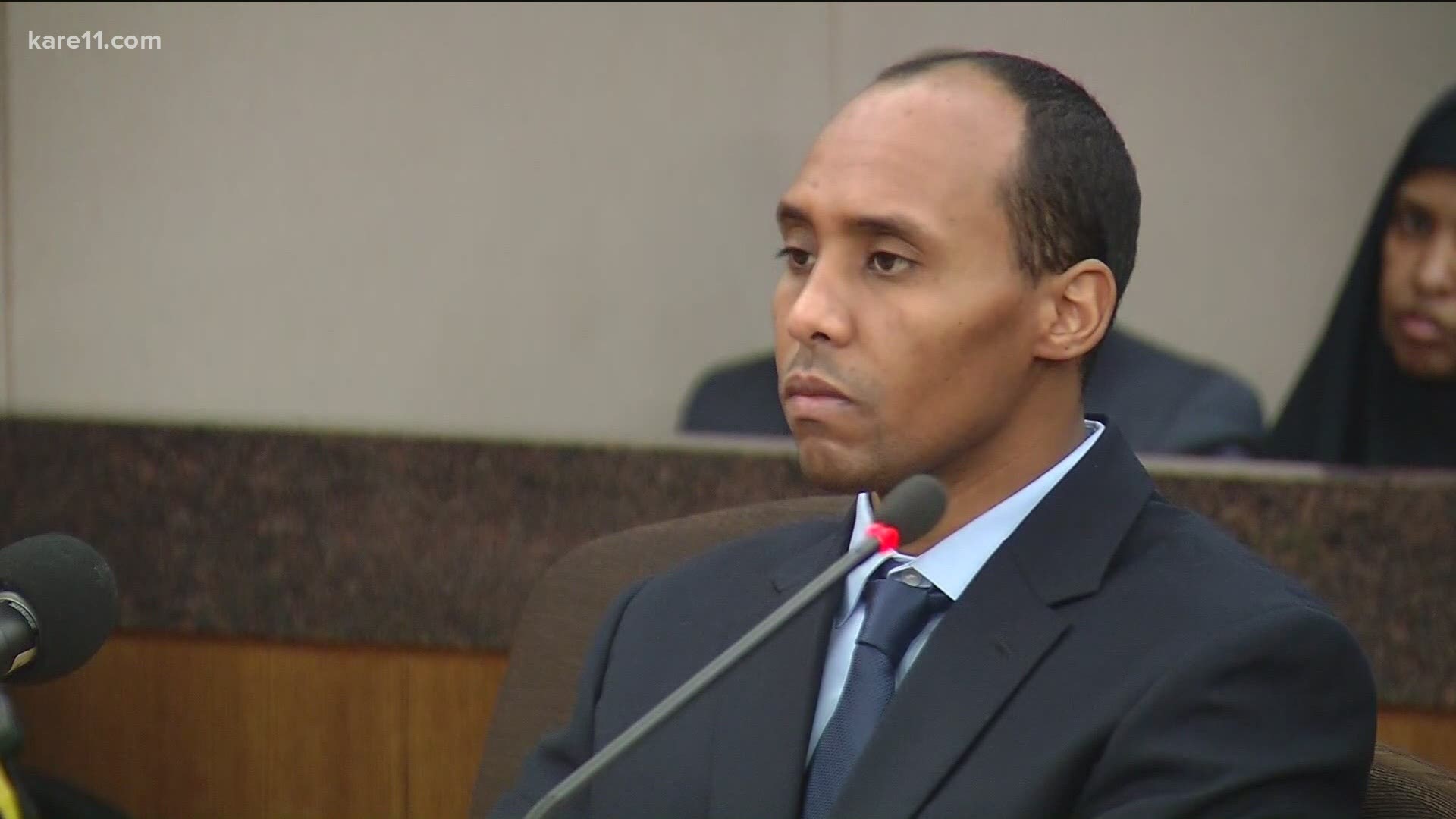ST PAUL, Minn. — The Minnesota Supreme Court has reversed the third-degree murder conviction of former Minneapolis police officer Mohamed Noor.
Noor was convicted of second-degree manslaughter and third-degree murder for shooting and killing Justine Ruszczyk Damond in 2017. The state's supreme court ruled Wednesday that Noor's actions were directed "with particularity," and therefore did not meet the "depraved-mind" requirement for third-degree murder.
Instead, Noor will be resentenced for his second-degree manslaughter conviction. He was originally sentenced to 12 years.
According to KARE 11's Lou Raguse, who has been following Noor's case, Noor could potentially get credit for time served and be released. He could also be released in late 2021 or early 2022.
Hennepin County Attorney Mike Freeman said his office is disappointed in the court's decision.
"The court overruled prior case law supporting the Hennepin County Attorney’s Office charging decision and we disagree with their analysis of the law," Freeman said in a press statement. "However, we respect and acknowledge that the Minnesota Supreme Court is the final arbiter in this matter."
Freeman said his office will seek the maximum sentence for the remaining second-degree manslaughter conviction.
Ruszczyk Damond's fiance Don Damond said he and his family are "deeply saddened" by the state supreme court's decision.
"I have lived with the tragic loss of Justine and none of this can hurt my heart more than it has been, but now it truly feels like there has been no justice for Justine," Damond wrote in a statement to KARE 11.
Damond said the Minneapolis Police Department has not made "any meaningful progress towards transformation" since his fiancée's death.
Ruszczyk Damond's family released a statement Wednesday saying:
"Our family woke this morning to news of the Minnesota Supreme Court’s decision that Mohamed Noor’s depraved and senseless shooting of our beloved Justine does not count as murder under Minnesota law. We are again heartbroken, because we agreed with the trial court, lower appellate court, and, most importantly, the jury of Minnesota residents who believed it does. Their voices should be respected. It remains for Noor to be resentenced for his conviction of second-degree manslaughter, a conviction even he does not dispute. While his new punishment may be reduced from the 12.5 years currently on record, our family knows that Noor’s conduct is just as reprehensible today as when he killed her in 2017. The Supreme Court’s opinion simply cannot change that. We look now to the trial court to sentence Noor for manslaughter equitably, but harshly, in a manner that reflects the loss which our family, Justine’s friends and the entire Minneapolis community continue to endure."
Mohamed Noor was on patrol when he responded to a 911 call from Ruszczyk Damond saying she heard a woman under attack. She approached the squad car with Noor and his partner inside when he fired his gun, hitting and killing her. Noor maintains he was acting in self-defense.
Noor's team appealed the third-degree murder conviction, and in February, the Minnesota Court of Appeals upheld it. Noor's legal team then officially filed a petition asking the Minnesota Supreme Court for review.
EARLIER COVERAGE: Minnesota Supreme Court takes 3rd-degree murder conviction for former officer Mohamed Noor under review
In June, Noor's attorney Caitlinrose Fisher argued to the state supreme court justices that the "depraved mind" element of a third-degree murder conviction requires that the "eminently dangerous" act is not directed a particular person. She said the Minnesota Supreme Court has upheld that requirement for more than a century and in 20 separate decisions, and should not override its own precedent.
“This has been and is intended to be a narrow crime,” she said. "When we’re talking about treating an unintentional death as a murder, that is a narrow class of cases."
Noor's attorneys did not ask for his manslaughter conviction to be overturned.
Also in June, Assistant Hennepin County Attorney Jean Burdorf appeared on behalf of the state. She said that the case law is unclear, and the state supreme court should do whatever they need to do, including overriding previous decisions if necessary, to clarify the third-degree murder requirements.
“Noor is arguing in essence he can’t be convicted of third-degree murder at all because his actions were directed at Ms. Ruszczyk," Burdorf said.
The state supreme court's decision on this appeal could have far-reaching ramifications for future cases, including fatal shootings by police officers, and could give ex-Minneapolis police officer Derek Chauvin grounds to appeal his third-degree murder conviction in George Floyd’s death. However, that would have little tangible impact since Chauvin was also convicted and sentenced on the more serious count of second-degree murder.

